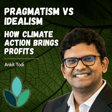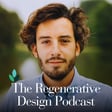The Swiss Army Phone: Intentional Use
00:00:00
Speaker
I do this thing called the Swiss Army phone. I have people write down all the things they use their phone for. It is ridiculous the amount of stuff we use your phone for. It's everything. You don't have to go buy all these things. This tool is awesome, but you have to remember it's a tool.
00:00:14
Speaker
No one walks around with a Swiss Army knife with every tool open.
Podcast Introduction: Regenerative Design by Mathieu Mehuys
00:00:17
Speaker
Hello and welcome to the Regenerative Design podcast. I'm your host, Mathieu Mehuys, and in this show, I interview the leading authorities in the world of regenerative practices.
00:00:29
Speaker
People who do good and do well.
Merging Business Success with Environmental Responsibility
00:00:31
Speaker
Are you a person that cares about your environment and our planet? Are you a person that wants to leave the planet to our children to be something that we can be truly proud of?
00:00:41
Speaker
Something to enjoy for many generations to come. But are you also a person that believes we can do all of this and do good in business? Well, I have really good news for you.
00:00:53
Speaker
You're here listening to the podcast that is all about making our planet a better place and making your business more successful.
Guest Introduction: Shannon Coulter
00:01:02
Speaker
Enjoy the show. Hello and welcome to another episode of the Regenerative Design Podcast. and Today we have a very special guest. Her name is Shannon Coulter.
00:01:12
Speaker
Shannon is a real expert in helping us to get off our screens. and You might be wondering, what does what in the world does that have to do with regeneration and
Balancing Technology Use for Humanity and Environment
00:01:21
Speaker
saving the planet? but Me and Shannon became really good friends through through a network event, and I see how important it is for us to learn to be able to work with technology and and like and not use it as something that works against it, because today far too many people spend way too much time on their screens, and that is actually stopping them from doing something good for the planet or something else. So I'm really, really curious to go deep into this topic of
00:01:47
Speaker
And for me, it's ah all about like this addiction of
Screen Addiction: Dopamine vs. Drugs
00:01:51
Speaker
dopamine. It's like you put on your screen and you're drawn into something in in Facebook, Instagram, whatever social media you're using.
00:01:58
Speaker
But I also believe that it's a massive and really important tool to help advance humanity and help save our planet and help regeneration. So it's little bit of the the double swords story.
00:02:11
Speaker
So I'm going stop talking now because I want to have you ah introduce yourselves. and And so first of all, Shannon, welcome to the show. How are you doing today?
Intentional Screen Use and Human Connection
00:02:20
Speaker
I am doing really well. am so happy to be online with you, my hair buddy. Yes. Shannon gave me a lot of tips on how I should maintain my hair. I know a lot about maintaining gardens, but I wasn't good at maintaining my hair. She helped me with that.
00:02:38
Speaker
That's hilarious. but Yeah, i am I'm really excited to be here. And you're exactly right. And I love that you started with the fact that we're not anti-technology at all. We're not anti-screen.
00:02:50
Speaker
It's just we have to use it with intentionality because if we don't, something that's supposed to be a tool that helps us and enhances our life turns into an environment that sucks us in and steals it. And that's what's happening to a lot of people.
Understanding Phone Science and Screen Dependency
00:03:03
Speaker
And I think you and i are so aligned here because you're helping people get back outside and make the most out of beauty ah that we have naturally in our planet. And one of the reasons people aren't doing that is because they're wasting their life on screens and they're missing out on the beautiful things right in front of us.
00:03:21
Speaker
And it's not something I think anybody's done on purpose. it's It's that, like you said, it's an addictive thing. And if we can teach people, just like you're trying to teach people all the nuances. I love what you say, like the soil that we're using, especially here in America, is like really not good for stuff. And they're they're selling us stuff that makes things die faster. Like that is incredibly important to learn.
00:03:44
Speaker
I'm trying to teach people what's going on with the science behind the phones, because I think once people understand it, they're going to have so much more knowledge. an ability to put the phones down and again, like turn it into a tool.
00:03:55
Speaker
So I think both of you are kind of, you and I are like knowledge ambassadors. We're just trying to tell you something to empower you to make your life better.
Reducing Screen Time for Well-being and Environmental Impact
00:04:03
Speaker
Yeah, I love that. And so in in that sense, we do have a lot in common in in our missions to help You're helping a lot of people. I'm helping nature, but I'm doing it through people because that's the only way.
00:04:14
Speaker
I find this is very, it's worth and doing because we have a massive impact on the environment. but but But you have a massive impact on the environment. But as you do that, Mathieu, you're getting people back outside, which has a massive impact on people's souls.
00:04:30
Speaker
Yes, yeah so not the soil and the soul. So I love that. And there's a big overlap. So when we can get people to get off their screens and do more things outside, it's going to improve their life drastically.
00:04:43
Speaker
And i jokeve I've made some social media reel that actually went viral, but I made something that said like and don't like, people say they don't have time to work in their garden, but then if you check how much screen time,
00:04:56
Speaker
They have. It's like a few hours a day. I'm like, well, you actually it. You know, the average is like five or six. Five or six hours a day. day. That's average. Yes. And that's your waking hours. That's your waking
Managing Dopamine and Habit Formation
00:05:09
Speaker
hours. The average adult loses 22 work weeks distracted.
00:05:14
Speaker
Shit, but that's the average. So there's people that are more on their screens than not. Yes. That's crazy. So I'm very curious to really dive deep into the science of it and and everything about dopamine. and and Someone told me recently it's kind of like the only drugs that is not outside of our body and that is inside our body.
00:05:33
Speaker
And we we need to find a way to manage it, but it's not like a drug we can get rid of. or you or you It's external, it's actually internal.
Shannon's Journey: From Corporate to Screen Time Advocate
00:05:41
Speaker
So right it's very curious. But what I first want to do is please tell me a bit more of your backstory because you're and a published author. You've written numerous books for kids to get them off screens.
00:05:53
Speaker
You have your own podcast. So I want to know more, like where did all of this start? What's what's your backstory and and yes what has made you the Shannon that you are today?
00:06:04
Speaker
Yeah. So the backstory is when i was like around your age, maybe a little younger than you right now, but like 31 years old, I met um my stepkids and they were four, eight and 10. And being the cool person I thought I was back then, and i was like, oh my gosh, you guys.
00:06:20
Speaker
I'm you guys have to go outside and play. And within five minutes, they came back inside and told me they didn't know what to do. And that was 2008. And it changed my life literally forever because I was so upset about it because to me, my whole childhood was being outside playing. Like that's all my favorite memories. And I think if anybody shut their eyes, who's listening to this right now, they're not driving, but if you shut your eyes and you think about your favorite childhood memory, it's going to be something that outside, I know it is, or something playing with somebody.
00:06:52
Speaker
I've yet to ask that question to any human being, and they say it's something on a screen. I love that. so So I, at the time, I didn't know why, but I knew somewhere deep inside in my gut, I would say the Holy Spirit was like, this is not going to turn out okay.
00:07:08
Speaker
And so I left corporate America, and I started a company with my husband to help parents get their kids back outside playing in the real world. And In a nutshell, what was happening with me is I really wanted the kids offline, but they would bother me incessantly because they were so bored and they didn't know what to do. And so then I go on Google and I find all this stuff and I was overwhelmed. Or i go to Pinterest and it was like so perfect. Everyone was so perfect and the crafts were so hard. Have you seen the show Nailed It?
00:07:35
Speaker
Have you heard of that show? i think I heard of it, but I'm not sure. It's a baking show where like people try to do really good baking stuff. Yeah. And it's terrible. And they're like nailed it. Okay. That was me with crafts. I was like, I can't do this. I'm not a crafter.
00:07:49
Speaker
So I was like getting really overwhelmed. And then I would get just kind of frustrated. And then when I would put the kids back online, like if you guys can't figure it out, you know what? So it's like this vicious cycle. And the more that I gave up on it and put them online, the more their brains were getting so more sucked into that, right? So i was like, how can I help people like me have activities that get their kids offline? Because then the more they're offline, the more we can talk about this later, but the more their brains are going to wire for that offline stuff, they're going to want to be out there. So I was seeing kids with like atrophied imagination muscles that I wanted to grow.
00:08:20
Speaker
And then they could come up with the stuff themselves. So how can we do that? Let's talk a bit more about those shrinking um or the brain because there is, I think in in one of our meetings, you you explained that because of all the screen time, the neocortis is actually decreasing in size or can can you help me out yeah with the science?
00:08:41
Speaker
Yeah, so it's the prefrontal cortex. Yeah, is the place that we get our executive function. So it's like how we learn how to be patient, how we learn how to have delayed gratification and things like that.
00:08:52
Speaker
It's also the place that can go crazy and um be used to It's also what makes us human, right? Yeah, well, it's executive functions. So it's that kind of stuff where you can learn face-to-face communication and things like that and how to do things. Yes, it's the CEO of your brain.
00:09:05
Speaker
um So that also, though, if it doesn't wire correctly, it can also become a place where you have no patience, where you expect ah immediate satisfaction, instant rewards and stuff like that. So what's going on, the the science behind this, and like everyone note, I'm not a neuroscientist.
Impact of Screen Time on Children's Cognitive Development
00:09:22
Speaker
Yeah. chris yeah But basically what happens is, I'm sure a lot of people have heard this, but neurons that fire together wire together. Okay. So you've got these little kids and the more the things do, that part of the synapses form, the little synapses form in your brain. Okay.
00:09:40
Speaker
So if you have a little kid outside and they're playing in a garden, they're talking, they're running around, they're climbing, that part of their brain is becoming like a six lane highway. It's getting better and better.
00:09:50
Speaker
You know what i mean? they're They're looking at other people. They're learning empathy and all this stuff. If you take that away and you put them on screens, that part is going to become the six-lane highway. So you've got, you know, you're on screens all the time with all these noises coming at you and all these different things coming at you, or you're scrolling on TikTok.
00:10:06
Speaker
or you've got all these sounds, that part of the brain is going to wire. And that's what's happening to kids. So it's not this like, oh, they just need to play more. It's, yeah, they do need to play more because that's where they learn problem solving and all this fun stuff like that. But also, you're taking away that part of their brain that they need for patience, creativity, like I said, talking, well looking into somebody's eyes and all that stuff. Yeah.
00:10:31
Speaker
And this became a real huge thing for me a couple months ago because I still, as much as I did to get my kids off screens with everything I did, I didn't know their brains were rewiring.
00:10:41
Speaker
I don't think any of us knew that back then. So I still let them be on those screens more than I would have ever if I knew what we know now. Because they still do stuff that bothers me.
00:10:53
Speaker
And it's not... um I get frustrated with them and I'm speaking probably for most Gen Xers right now. and We get really frustrated when we look at the younger generations and see them on phones because we, like, but I'll ask you this, Mateo. Like if you see someone you love doing something that you know isn't good for them, you kind of get, and you can get mad and angry, right? frustrated.
00:11:13
Speaker
I think that's what's going on with people like me when our frustration comes out because we're like, what are you guys doing Yeah. like That isn't good for you. We want you to have this thing we loved. And it's coming out in the Xers because we're kind of jerks, to be honest. It's coming out of like, it's kind hard, but it's coming out as frustration. So I was getting still frustrated with my own kids. Like, why are you not going out Saturday night?
00:11:36
Speaker
You know, why don't you want to go and play volleyball, blah, blah, blah. And Gavin, who's my youngest, he's 22, he goes, yeah, this like made me cry. He goes, it's not my fault. And I was like, and as I started doing more research, it's not their fault. Their brain is not wired for it.
00:11:51
Speaker
So the things I'm craving do the going outside to do the gardening because that part of my brain is wired. Yeah, you didn't have the screens when you were a child. No. and And hear me now, though, because we have these screens now, our brains are rewiring, too. Like, we have to all get off these things. The the brilliant thing about this is our brains, that they're plastic and we can rewire them and the kids can, too. So that's the good news. That's the good news.
Generational Effects of Technology and Brain Health
00:12:15
Speaker
But that's what really got me going. Like, he just said that to me a couple months ago and I was like, oh, my gosh, you're right.
00:12:20
Speaker
But I can't understand it because I'm not wired the same way. um I know people, you've probably seen those videos when little kids get like the iPad taken away um and they go absolutely completely insane. Have you seen those? No, I haven't.
00:12:33
Speaker
Okay. If anybody hasn't seen those, just look that up. A baby will have a phone taken away or a kid will have an iPad taken away and it's like a demon comes out of them. They're insane. And I used to watch those and be like, oh my God, like what bad kids?
00:12:45
Speaker
They're terrible kids. They're terrible kids. They're terrible children. But it's not their addicts. So imagine taking the beer away from the alcoholic or the needle away from the heroin addict. it They're not going to react well to you.
00:12:58
Speaker
This podcast is brought to you by the Garden of Your Dreams Masterclass. Are you struggling with finding the right tools and tricks for your garden? Are you lacking the confidence to be a self-sufficient gardener?
00:13:10
Speaker
Do you sometimes get overwhelmed by the lack of knowledge and time you have to actually do gardening? Then the Garden of Your Dreams Masterclass is for you. And that has to do with with the dopamine, right? So somebody a few days ago told me, like and he's he's one of my clients, he's in holistic grazing in Ireland, and he said to me, like dopamine is kind of the only drug that is inside of our body. we can't like If you want to quit alcohol, you just keep it away from you.
00:13:40
Speaker
you one If you had done drugs, you just keep it as far away from you, whereas dopamine is it' inside of you. And it's very have get the dopamine. You got to get the dopamine hits from the good stuff, from the sun.
00:13:51
Speaker
that so that was actually my next question. Like yeah dopamine serves a purpose, right? What is the purpose of dopamine? So it's interesting. i I love that you asked me that. I actually so did a little bit in my class that I teach on dopamine and I'm so interested in it. moment i have to talk I'm doing a whole module on dopamine because I want to learn more about it.
00:14:09
Speaker
But it's the it's your brain's, I just won something chemical. Yeah. Oh, yeah. That's what it is. But it doesn't solve – it doesn't solve the thing you're looking for. It just makes you want more. It feeds it. And that's the problem. It's like it if you had an itch. know when you get an itch and you start scratching it and it gets worse and worse?
00:14:25
Speaker
Yeah. You what I'm talking about? going to do it scratching your whole body. You're like, oh, that's dopamine. Yeah. yeah So you just, it just makes the craving more and more and more and more. And so with your phone, the way it works with your phone.
00:14:37
Speaker
So phones are designed like slot machines. Okay. So you may know this, but I love the machines. Oh, I'm sorry. Yes. sorry and When you go to, um, gambling, when you go to a casino, and people are sitting in front of those machines, those crazy machines, that's a slot machine.
00:14:53
Speaker
yeah Okay. So why do you think people sit in front of those? What do you think they're doing? i by accident, I actually learned about it couple of days ago that they they let you loose as long as you're like, ah okay with it until you like almost want to run away and say like, this is it.
Addiction: Phones and Slot Machines
00:15:10
Speaker
Then they give you some kind of a reward.
00:15:12
Speaker
it's in It's called variable rewards, okay? So they're not sitting there because of the prize. They're sitting there because your brain becomes obsessed with the with the inconsistencies. You're like, but I want to get to that one good thing. And so they get they let you win sometimes, but not always.
00:15:26
Speaker
And that's the same exact way the scroll works on our phone. So sometimes you get that, um you get the video, let's say we're just going through shorts, you get a short that's like really heartwarming, and then you get one that makes you upset, and then you get one that's cute, and your our brains become obsessed with the next dopamine hit.
00:15:43
Speaker
So yeah I'm sure you've done it, you're on there, and you're like oh, I really like that one. But the next one isn't like that, so then you go for the next one, it's not like that, but you're my gosh, just one more. That's how it works. Oh, it's really set up in such way Because our brains become obsessed with the next hit.
00:15:58
Speaker
So that's the the inconsistencies make us like, oh, I got to get it. So it's purposeful. And the other thing I just brought up infinite scroll, the other thing with infinite scroll that's getting people addicted is that with as it's going, you don't have any natural stopping cues.
00:16:11
Speaker
So like in life, you finish a glass of water, you put the cup down or like you finish a chapter. Mm-hmm. It just gives your brain like, oh yeah, I'm done. With infinite scroll, it takes that away so you lose complete control or complete, ah let you you lose the time. You don't know where what where the time has gone.
00:16:29
Speaker
yeah So that's those are two things that are going out thinking that, so does that mean like dopamine used to serve us very well if we were like, hunter-gatherers and we needed to find the prey and it's like, okay, I'm going to do everything to to find food.
00:16:43
Speaker
And then when you have the food, it's like, oh yes, you you succeeded. You get a dopamine hit because that's what you wanted. and Yeah, I think some of that's
Positive Dopamine: Gratitude, Prayer, and Brain Rewiring
00:16:52
Speaker
it. did The good dopamine, I would say, is when you do a gratitude chart.
00:16:57
Speaker
oh You know how good you feel or when you pray? yeah You know how good you feel after that? That's a good dopamine hit. Yes. And so that's why I think, and like and I want to go deeper into this, like in my studying, but I think that's why also with the rewiring, that's why people want to do that stuff more. So if you go out and you, um if you go out and run, right, you're going to get spikes of good feelings and that you're going to want that again. it's that It's the thing that you want again. You're chasing that feeling. Yes. Yeah, so you want to be chasing, because that happens with alcohol too.
00:17:29
Speaker
um you You have the alcohol and you get that small dopamine hit and then you keep drinking, drinking, drinking, drinking drinking right? So we want to be having dopamine hits that are good for us. Yes, yeah. So yeah, but we're going to have to talk more after I do my research. Yeah, I'd love to hear more because then it also has to probably do with delayed gratification. How long how how long and how consistent can you do something without seeing a result and not being rewarded for it?
Screen Time, Long-term Goals, and Delayed Gratification
00:17:55
Speaker
is the other nothing thing. And that's probably when I feel it even in my business, when I'm constantly working, I'm and trying to get the results with whatever I'm doing. I'm like, there's a new client, we need to have conversations, a follow-up. and that but It can take days, if not weeks, sometimes longer.
00:18:10
Speaker
And so I have to like always delay my gratification of having that client. And when I've done that like consistently, it's very nice and very comforting to go and just take a phone and just scroll and get some dopamine.
00:18:26
Speaker
Yeah, well, and you know, that's okay. Like, here's the thing. if you If you're intentional about it, you're like, right right now I am going to scroll for an hour. I want to go on X. I want to get some news. That's fine. The problem is that people are doing it all the time. All the time. It'd be like eating dessert all the time.
00:18:41
Speaker
You just can't do that. You're gonna be in control, right? So, but you can have a glass of wine every once in while if that's something, or you you and I talked about coffee, right?
00:18:52
Speaker
You were like, I used to have coffee all the time. And you're like, okay, so it's everything in moderation. That's gonna be the healthiest person. yeah um but But you said something there, oh, the delayed gratification. That is another thing that's really harming ah the younger generations because they're so used to the constant stimulation They get constant rewards. Constant rewards. costume reward you You order something on Amazon, you order it's next day there, or you you order online, you have your food delivered.
00:19:21
Speaker
ah hu Well, there's that, but there's also the constant right in your face. Boom, boom, boom, boom, boom. yeah that's real That's the rewiring that's going on. and that's why everything yeah So everything is right at their disposal. So doing something like, I don't know, going to the gym for a year straight so that you actually improve your health and you actually see results is very hard.
Early Childhood Media and Brain Development
00:19:42
Speaker
yeah In general, I think it's not even generational. It's it's hard in general. yeah So imagine if your brain's not wired for that. You know what mean? It's really hard for them. And I, in my class, I have this guy speak. I can't, he's a doctor and and he did this thing. I think you'll find this fascinating. He did thing back, this was 2011.
00:19:59
Speaker
And he was looking at how screens and overstimulation can hurt kids. And he showed baby Einstein. Have you ever heard of baby Einstein? Don't know feel bad. I hadn't really, it skipped me too.
00:20:10
Speaker
But it wast it was this thing that parents would put in for children. And it was known like it's baby Einstein, you know, this is good for them. And he was showing even how much that old baby Einstein was bothering kids. So one of them, they go to a farm and he showed it and like there's chickens and all of a sudden there's cows. And then all of a sudden there's this weird doll thing that flies through and there's music and there's lights.
00:20:30
Speaker
And he goes, adults, when we watch that, we're like, oh, this is like disturbing. Like, why is this happening so fast? But the babies, thats their brains is getting used to that. So then when they go to an actual farm, they're like, why aren't you know why aren't the chickens popping up in my face? And why do I actually have to walk to get to the cows? And where's the music?
00:20:49
Speaker
See what I mean? Yeah. Are you serious? am. Yeah. walk to help um Well, I'll give you, and I was thinking about you with this too. it was like, Matthew would love this. So the same guy did a mouse experiment. So he took mice and he put them in like surrounded by noise.
00:21:04
Speaker
So was like it would be like watching TV. And I want people to understand, I'm just talking TV now. This 2011 before like all this social media come came out. so they're in a They're in a thing, they've got like stimulus around them like they're watching TV. And then they've got a mouse, you know, in a quiet thing.
00:21:18
Speaker
They put them into a box and then they track them. So the the mice that were normal, right? They stayed on the outside of the box like a mouse would because, you know, if you run into the middle, mice would get eaten, you know, by birds.
00:21:30
Speaker
So this mouse would stay on the outside of the box and every once in a while would go to the middle to see if there was food. Totally normal. The mouse that had the stimuli all the time ran all over the box like a crazy thing.
00:21:41
Speaker
Okay, and then they did a second thing. They took the same mice and they put like an object in the box and both mice the first time checked out that first object because it's new, took them back out, put a second object in.
00:21:52
Speaker
The normal mouse went in, checked out the first object that was there and it was like, oh i've already seen this and then spent the whole time at the second object. The mouse with the stimulus came in and spent the same amount of time on both.
00:22:03
Speaker
Just, yeah. So it's making, so with that, like in mind, um my studies has told me like ADHD symptoms, like impulsivity, distractibility and all that, that's going way up with the screen usage.
00:22:15
Speaker
Oh, yeah. Yeah. So I thought you would find that interesting because even the mice, yeah. Yeah. it's very So that also puts some light on why there's so much ADHD and other disorders that I was thinking like that a lot of it is made up or it's it's not really real. But now that I understand it deeper that your brain is actually changing.
Lifestyle, Diet, and ADHD Diagnoses
00:22:39
Speaker
So it it is something that can be diagnosed, I guess.
00:22:42
Speaker
but So there has to be work has to be done to reverse it. Well, I think there's two things. I'm with you on that because I was like, oh, not everybody has ADHD. But there is there is the the rewiring thing that's going on. But also, if we look at schools, especially in the United States, they've taken reor ah recess away from the kids. I would have never made it through.
00:22:59
Speaker
Like, we had rec recess all the time. Now they're having those kids sit still. Like, I i don't think you would have made it either. I'm like, get me out of here. Yeah, was already really hard move. Yeah, that's a double thing for sure.
00:23:11
Speaker
I think they're calling a lot of kids who are just being like kids. They're just being kids and they're like, oh, you have too much. Well, they're kids. have too much energy. at you yeah play out Hello.
00:23:21
Speaker
And I think a lot of it also has to do with the diet. and And then we get into farming and agriculture and the chemicals that are in the food. And yeah adding that to to ah the problem you are facing is probably making it even even worse.
Smartphones and Children's Mental Health
00:23:37
Speaker
I'm now curious to understand from your perspective more, like if you would look only at all the problems of the phone and the screen and everything, you could say like, oh, this thing we should like throw it away and we should go back to Nokia cell phones.
00:23:50
Speaker
ah And there's something to say for it. Actually, i have a client, he has ah and a smartphone and a normal phone. And so he keeps two separate because he can't ah use both. So yeah, I found that interesting that people are starting to do that.
00:24:04
Speaker
i I think that's a good idea. So what I would say is that I don't think a child should have a phone, like a smartphone, until they're, I'm going to say 18. I just don't think they, it's ah it's the internet in their pocket.
00:24:17
Speaker
So, um and if anybody thinks I'm being crazy, think about going through puberty with social media. shit, yeah. Think about how hard that would have been. Like, we had to go through it with, you're just trying to keep up your your identity and who you are in front of your peers at school.
00:24:32
Speaker
Right? Imagine... Having to keep a brand your online brand. Yeah, that's like running a business. Oh, it's like running a business. Plus You're seeing all these quote unquote perfect people all the time because people only post you know the perfect side.
00:24:48
Speaker
Imagine what that's doing to them. That's what's happened to Gen Z. They were the first ah first generation to go through puberty on social media. It's crushed them. They are the most anxious generation there's ever been because they're just, we're constantly seeing comparison, constantly having the dopamine hits, constantly seeing bad news.
00:25:04
Speaker
um And their brains are wired for anxiety now. Because you know they're in a constant state of stimulus, right? So I don't think children should have smartphones until they're 18. They do not need them.
00:25:18
Speaker
And like if anybody's like, oh, come on. No, they don't need them and they want to play. If you put a child outside and get them playing, they want to play. That's what they want to do. That is like, that's what we're, we're born to do.
00:25:29
Speaker
Yeah. And that they're craving it. So, but with adults, here's the thing. I, um, I do this thing called the Swiss army phone and I have people write down all the things they use their phone for. it is ridiculous.
00:25:42
Speaker
The amount of stuff they use. Yeah. think I couldn't even believe it. i only like like I wrote down a few things and then we all started listening. I was like, oh my gosh, you use it for everything. mean, it's your flashlight, right? yeah Yeah, it's your it's your thermometer.
00:25:54
Speaker
It's everything. so what i have people right So what I have people do, instead of having to go, it's true is your alarm clock. You don't have to go buy all these things. This tool is awesome, but you have to remember it's a tool. So what I have people do, if i want if people want a quick little thing that I can help them with, think of a Swiss Army knife.
00:26:10
Speaker
No one walks around with a Swiss Army knife with every tool open.
00:26:16
Speaker
really dangerous, right? It's really dangerous. Right? you You take the one tool out, you use it, you put it away. You put it back. You put it back, right? Use your phone like that. Yes. It really helps. You pick up your phone, you say, I'm going to use this to um take a picture.
00:26:31
Speaker
You take the picture, you close out of the app, put the phone down. Oh, yeah. That's brilliant. And that was, it's as if you read my mind, because I wanted to get to the point where I do believe that the smartphone is a piece of technology that enables us to to be worldwide connected.
Smartphone Use: Balancing Positives and Negatives
00:26:49
Speaker
you i can call anyone at any time, anywhere in the world. i can send videos, files,
00:26:55
Speaker
Like it's um it's a very powerful tool that is already transforming humanity in a good way. But now we we we kind of have to and get rid of the bad things that it also come came with because it's it's kind of like this double-edged sword where you can like ah I think it reminds me, someone told me that like a knife, for example, you can use it to to cook a really beautiful meal, and and a five-star meal, or you can use it to stab someone.
00:27:23
Speaker
It's the same tool. And and that's yeah what a phone is too, in my opinion. Yeah. We got learn how to to use it to cook that beautiful meal instead of stabbing someone, which in that case you're stabbing yourself almost.
00:27:38
Speaker
Yes. I'm curious to know more techniques that you could use it for cook that beautiful meal. Yes, absolutely. Yeah, so like with kids, i did like I said, I don't think they need a smartphone. They don't think they should have a smartphone. They don't need it.
00:27:52
Speaker
I do think, and I will be coming out with purposeful technology. they They do need to learn technology. They do need to learn a good relationship with them. You don't want to throw them into college or whatever into the working world and have them not even understand how to type, right? So I'm not saying that.
00:28:07
Speaker
But when they're online, it should be something – ah educational for them. So yeah like, like, you know, I'll go and watch a baking video and then go bake. You know what I mean? Versus, you know, just use, that's the kind of thing they should be doing, but they're 75% of their time, 80% of their time, let them be kids, put them outside, you know, let them learn and and don't put them on the phone.
00:28:28
Speaker
And on social media, so they're learning all the bad
Tech Industry's Role in User Addiction
00:28:30
Speaker
stuff. like They don't need to know all the stuff that's going on. yeah yeah it's So then with adults, I think there are so many things you can do. i if If you can learn, first off, if you learn that big tech is following the same playbook as big tobacco to addict us,
00:28:45
Speaker
They know exactly what they're doing. They know it hurts us. And they're they're using us as raw material as commodities. So one of the things that I've learned, which made me like have to run around my house and like try not to pull my hair.
00:28:59
Speaker
So mad. But they learn who you are. There's all these sensors on your phone. And in the class that I teach, I actually turn i teach people how to turn the sensors off so that the algorithm can't. I'll tell you.
00:29:11
Speaker
But... You've got to learn to turn these sensors off because your phone can track you through your house and know when you're going to the bathroom. like that's how And so they know, like, right now, Matthew's going to the bathroom. I've got his undivided attention. I'm going to send him advertisements.
00:29:24
Speaker
That's how bad this is. And they will... They'll learn who you are. Like, I'll be totally honest with me. Like, it's very easy to get me with body image stuff, okay? So they know when I'm laying down based on what I'm doing.
00:29:36
Speaker
And they're like, if we show her five body things, then we can push her with this ad for like wrinkle cream. I'm not kidding. So if you can train your algorithm and you can do that, you can say, I'm not interested. You can um not react to certain things. You can train your algorithm to be something that's pleasant to you.
00:29:54
Speaker
So, you know, for me, I like to hear a lot of stuff about faith and I love
Light-hearted Moments: Shannon's Dad Jokes
00:29:57
Speaker
cats, right? it's like building mine to just show me like Jesus and cats. Yeah. You know what I mean? Is that something else that our listeners need to know? You wrote a book called... Oh, God's Dad Jokes.
00:30:09
Speaker
God's Dad Jokes. I love that. Just crack one now. Just give me one. of Oh, gosh. That's a good one. Okay. What's Jesus's favorite karate move? What's his favorite karate move?
00:30:21
Speaker
I don't know much karate moves. You don't have to for this one. It's a dad joke. Ready? Yeah. Ready? The lamb chop. Okay.
00:30:32
Speaker
That's hilarious. I think the best one was that you told me was why was Jesus kicked out of the water polo team or something? Oh, why did he get kicked off the swim team?
00:30:43
Speaker
Oh, the swim team. Yeah, because he was walking on water. That's hilarious. Good. so So yeah, what what other tips and tricks do you have for people to actually start using that tool?
Practicing Intentional Phone Usage
00:30:57
Speaker
as ah you You already gave great advice that I'm going to use because what I feel sometimes I'm like, I'm going to make a phone call or but do something and I finish and I see myself going to that Instagram app and um before I go, I'm scrolling and I'm like, shit, how did that happen?
00:31:13
Speaker
Swiss Army phone. Swiss Army phone. yeah Close it down and then only like, like look and I'm going to use Instagram. Physically put the phone down. Physically put the phone down and then pick it back. It it will, it does wonders.
00:31:24
Speaker
Because it's that natural stopping cue I talked about. Oh. It's like I'm done using mobile. We're rewiring our brain that. Yeah, that you're done. One thing after the other. Yeah. um And you're being intentional. The other thing, I think the other easy thing that I could give people right now is put friction between yourself and your phone.
00:31:40
Speaker
So if you, there are there are apps on your phone that you can put that you can, you know, have it turn off after 15 minutes in it in a um and Facebook and stuff like that. that is Oh, yeah, I have that. Yeah, but that's relying on your willpower.
00:31:54
Speaker
And willpower is only so strong. The longer you go in the day, willpower is right in the morning. How's it doing at night, right? It's not that great because you're tired. So these are things like you can use your willpower a little bit, but if you're sitting ah asz your desk and if your phone is even within your eyesight, you're losing some of your brainpower trying to keep off your Right. So it's here. I'm just going to throw it there.
00:32:20
Speaker
Yeah, you're trying to get yourself not to pick that thing up. Yeah, it's true. So you're reducing your bandwidth as you're always like. Yeah, because it's hard. And even if you have it on Do Not Disturb, you can take it off of Do Not to st Disturb. but So you wanted like you just did. Get it off your desk. Get it out of your sight.
00:32:35
Speaker
And I would even put it so far away from you you have to get your butt out of your chair and go walk and do it. because then you're intentionally like, you know what? i am going to And if if you're worried you're going to forget something, have a piece of paper by you. Like, oh, I got to make a phone call. Just write down the phone call you have to make.
00:32:46
Speaker
You will be so much more efficient because there's a ah study that showed that we switch tasks every three
Breaking Phone Habits with Offline Activities
00:32:53
Speaker
minutes. Okay. And it takes us 21 minutes to get back into deep focus.
00:32:58
Speaker
So think about like how inefficient you're being when you do that. Hmm. So, yeah, I think the friction is a huge one. I love that because... Yeah, and the other thing you can do, and Mathieu, you'll love this, when you go to grab your phone, um instead of grabbing it, do five sit-ups or five push-ups.
00:33:18
Speaker
I love that. Because you're you're switching your habit. That's from... um Where did I get that from? Every time um I would have like a compulsive thing of like, I want to do it, do five push-ups. Yeah. Yeah.
00:33:28
Speaker
Or like, what yeah, because then you're gonna get in shape and you're like, i'm not going to do that. Yeah. yeah So little things, you know, and then you can build, you can build on it. But those are those are like the easiest things I think you can do.
00:33:40
Speaker
That's great. That's really, really valuable advice. I'm definitely going to start applying it because I also see how crazy it is that even when I walk around in my house, I need to go like from here to the kitchen. I will take my phone.
00:33:54
Speaker
Right? I talked to someone, I'm like, why Why the hell? I don't need to do that. It's like, yeah. yeah Well, that's another thing that I learned is it's called a habit loop.
00:34:04
Speaker
um And that's what that all this stuff starts doing. It it starts creating... um habit loops, all the dopamine hits. And so think about this. Anybody who's listening to the show right now, you're going to find yourself sometime, like Matthew just said, ah sometime today, your phone's going to be in your hand you're going be like, how did it even get here?
00:34:22
Speaker
Because habit loops get, get put into you. And that's what happens with alcoholics, with drug addicts and anything. I feel this way. I take a drink, dopamine hit, feel this way. I take a drink, dopamine hit. So with the phone, it's cue. I'm bored.
00:34:33
Speaker
Action. I pick up my phone. Yeah. reward is whatever you just want to look at. and and And if you do that enough times, it becomes something called a habit loop. but That's why, I mean, it happens to me, like I'm teaching the class and still sometimes like why do i have my phone?
00:34:46
Speaker
Because I was bored and I just went and picked it up. that's why you're doing that friction thing that I'm telling or the the pushups or sit-ups to stop yourself from doing that. Nice. Yeah, that's brilliant.
00:34:57
Speaker
Let's let's talk a bit more about your other visions and what else you still want to create in the future. I'm I'm very excited because you're doing this together with your husband and you guys are working on a project where you actually want to create.
00:35:10
Speaker
ah Let's let's I'll just ask what is the project that like you actually want to build a ah place? what What is it like? What is the goal? Why why are you doing that?
FASA: Engaging Kids Offline
00:35:18
Speaker
so So my kids' product is called the Planet FASA.
00:35:21
Speaker
And FASA is Fun Activity Stories Service Awards. And that is a whole a whole ecosystem where we're trying to help families break free from screens. Not be screen-free, but lives are now about connection again, right? So it's it's I've got the kids' books so kids can read about – my characters are cats and dogs – but kids can read about um these characters who've got good values and And they learn things and they see them yeah getting obstacles done and using their imagination.
00:35:50
Speaker
And then the books have activities in them and the activities has points. And then the points are tied to that thing I was talking to earlier. The thing I put together for me, really, like back back in 2011. I have an app that's coming out now. But what it is basically, it is an app.
00:36:04
Speaker
that is for parents, but it's hundreds of offline activities. So when you, and they're all, i have mind, heart, and body points, because that makes a full human, you know, for three things, right? Mind, heart, and body points. Mind, heart, yeah, mind, heart, and body points, depending on the type of activity it is.
00:36:21
Speaker
And so what happens is, let's say me back in, you know, at 31, these kids keep coming up to me and let's say they're kind of just kind of being mean to each other as kids can be. I go, okay, I need a half an hour.
00:36:32
Speaker
I need heart activities and I don't want any materials. I put those three search things in and my app goes boop. and gives all these different activities for them to do. oh And they're all tied to points. And the kids are jazzed because they're getting points. And then the app allows the parent to set up rewards that the kids can earn.
00:36:48
Speaker
And these are like things that you give your kids anyway. Like, I don't know, you get to pick the movie on Friday night, or um you get to have a friend over. But you can set what they are. You can set the amount of points the kids have to earn.
00:37:00
Speaker
And you're just incentivizing them to earn points by playing. Can you imagine that? You get points for playing. But the iness the idea is the kids, there's a lot of activity apps out there, um but they're not tied to points. So I did wellness programs before I did this.
00:37:15
Speaker
People love points. Points, yeah. Yeah, we love points. We're silly. I get excited when I get points. Yeah, I gamified it. But I get excited when I earn points. by you Some kind of status is what moves people because we're yeah part of community.
00:37:30
Speaker
they were with deep fear is not belonging to a One of our deepest fears is not to belong to something. yeah That's why a lot of people are extremely depressed and and suicidal that they don't belong to something.
00:37:43
Speaker
And that's like a primal instinct because back in the days when you were in the in the wild, If you didn't belong to a tribe or a community, you're dead. There's but was it yeah animals that could kill you.
00:37:55
Speaker
So we still have that instinct. And using that for a good thing is is amazing. yeah It's actually funny that they they asked and Napoleon when he was dying, like, how the hell did you get to move whole Europe to... Like and to to they like some people walked...
00:38:14
Speaker
by foot from france to moscow that's a long way and it's long way it's it's cold in moscow yeah like how did they do it he asked him and he said the only thing that i did is i gave them ranks and status and and if you go and look on the napoleon army you'll see all these generals with tons of batches on them like like the high ranks they like their whole suit is badger And he said that's the only thing that that ah mattered the most because we had they had a sense of belonging to something. Now, it might you can argue if it was for something good or bad, but if you use it for for something good like you're doing, yeah it's very powerful.
00:38:52
Speaker
Yeah. People want to play. We want to. I was going to say, I get excited when I get points for using my own credit card. It's like idiotic. But um so we've tied it to points because I wanted the kids, I wanted the kids to kind of want to come and do it.
00:39:08
Speaker
And the idea is mom and dad are going to give them this stuff anyway, incentivize them with points. They come home on Monday, Tuesday, Wednesday, Thursday, Friday, you know, like, oh, I want dessert. Well, you got to earn 200 Fawcett points. And how are they earning it? They're playing.
00:39:19
Speaker
We have chore ones in there. you know So the kids are doing And as they're doing it, Mathieu, the idea is that imagination muscle is wiring. And so then they'll need it less and less. you know They'll come up with games on themselves. And we're going to add to it. It's in beta right now. But we're going to add to it a free play thing. So if your kids went out and it was supposed to be half an hour and they played for three hours, give them more points because that's awesome.
00:39:38
Speaker
Yeah. So that's the idea behind that. But where we want to go to is eventually i have the books I said, I've got this app and the kids get to pick one of my characters to be their
FASA's Future: Interactive Learning and Nature Play
00:39:47
Speaker
little avatar. And then they can, they can go and read the book about the characters because they're all different. You know, but we got the jock, we've got the, the motherly one, you know, we've got the the fun, silly guy. Like they get to pick who's like them.
00:39:58
Speaker
I go to read the books. My, my dream eventually, and I can tie you into this. There's two things. Um, I would like eventually to have each of these characters have their own imagination and the kids can have, they can go online, like I was saying earlier, and they can do stuff for points online that they can repeat offline. Because i want like I said, I want them to learn technology, but i want it to be beneficial. So let's say they go into a place where they learn gardening.
00:40:23
Speaker
So they're learning it They're learning about soil, whatever we would come up with. They're like, oh, I can put this, this, and this into a pot and this makes a plant. And it's like, oh, that's great. Now, if you go and do that in the real world, you get more points.
00:40:34
Speaker
Hmm. So it's them learning, I can use technology to learn something really cool I can do in the real world. world So that's where I want to go with it. And then my other dream that you and I talked about is Fossett Family Fun Parks, which is like, out of control. I would love to set up, the full dream is I would love to work with Matthew and set up little parks throughout the countries that like are different things. Like we talked about like a mud park.
00:40:59
Speaker
yeah It's just mud and the kids can go and they can just have fun. They can get their points there, but they're in nature. It's safe, but also i not too structured. I know there's a really cool park.
00:41:11
Speaker
I want to say it's New York City, but it's it's crazy. It's got all this junk in there, and they don't allow parents to go in, and they watch the kids, and the kids are in there hammering stuff. And so they've got an adult on the outside, but they're letting them rough play and stuff because kids need that.
00:41:23
Speaker
I would love that. Like your kids go in, let them get dirty, let them play with stuff. And i my biggest dream is I would love to have around it veterans. who would, I'd love really love to have the kids in there, ah space on the outside for the elderly to play their games, you know, like S and all that stuff.
00:41:43
Speaker
And then be guarded so you don't have to worry about your kids because no people get concerned. I would love to it to be guarded by veterans. That's the dream. well well So we have but yeah three great groups there. Amazing.
00:41:54
Speaker
Yeah. And you have a name for that already? The FOSA Family Fun Parks. Fasa Family Fun Parks. That's so cool. I mean, it's just fun. and And anyone's wondering, Fasa is Fun Activity Story Service Awards, but it was um my main character in my stories is Mufasa.
00:42:11
Speaker
He was my cat. And I had to not call it Fasa. So Mufasa is from the Lion King, but I changed it to Fasa. Is he the wise ape? he No, no, he's the the lion.
00:42:23
Speaker
He's the Lion King. Oh, Mufasa, yeah, yeah, yeah. Yeah, Mufasa. But I had to change his the father, yeah, yeah. Yeah, and add an S so that Disney wouldn't sue me. And besides, Fasa is fun to say. That's true, Fasa. Okay.
00:42:34
Speaker
Great. yeah I love it. So anything else you want to share with the audience? Like even let's tie it back to, to regeneration, to doing something good for the planet and the environment. What, what advice do we have for people that are, maybe they're overwhelmed. Maybe they say like, I want to get more out of my life. I want to, I may be tied in, in a job that I don't even like. And I'm coming home. I'm constantly scrolling.
00:42:58
Speaker
ah Like what advice do we have for them? If they would consider going on a mission to, do something good for the environment or business or combining that because that's what what I with my podcast I want to show the world that you can do good for the environment and you can do great in business so what what advice would you have for those people that are ready to to go there but they're holding themselves back I think, okay, I always say this, but I think there's a light inside of everybody.
00:43:28
Speaker
And you have to let that shine. And if if you're unhappy all the time, you're not letting it shine. There's something that you're missing. um and And you might not be able to get out of your job, but you can do something in the morning and in the night that makes you feel that joy. And even if it's as simple as in the morning, something and I have people do, try it for three days in a row. In the morning, don't pick up your phone.
00:43:51
Speaker
Like a lot of people wake up and pick up their phone. Don't do that. um Put a notebook over your phone with a pen. And for three days, get up and write three things you're grateful for and three things you intend to do for the day. see And you're grounding yourself in a beautiful thing. that will give you a dopamine hit too. But like what three things am I grateful for? It can be as small as like I'm grateful for my pillow.
00:44:14
Speaker
Like it doesn't have to be anything. Gratitude can be anything, right? I'm i'm grateful that I have warm stock on right now. Someone said to me, it was my one of my other mentors, he said, like, you don't know what if you don't know what you can be grateful for, check your pulse.
00:44:30
Speaker
Yeah. Yes. You're alive. That's pretty cool.
Pre-decisions for Healthier Routines
00:44:36
Speaker
and if you And if you start with little things, you you then you realize how great everything is. You're like, oh my gosh, I'm eating today. So if you start with that, and then if you're doing your intention, again, just like the same thing, the intention could be like, I'm going to shower today.
00:44:48
Speaker
That's hard for some of us now.
00:44:52
Speaker
Well, if you're like you, then it might be. It can be a pain in the butt, right. So, um yeah, so it can be any little thing. But the cool thing about it is you're not getting sucked into your phone in the morning and letting somebody else leave your day.
00:45:04
Speaker
Yeah, yeah, yeah. Because they'll lead your day. I have something that I've learned that I do because i think that's a few years ago I decided no more phones in the morning, at least for an hour.
00:45:15
Speaker
And then yeah i what I heard, if you tell people don't do this, it doesn't actually work because you like our brains... We cannot focus on something negative. It's like, Shannon, don't think about pink elephants.
00:45:29
Speaker
I'm thinking about elephants. did you think about? Yeah, exactly. It's really hard. So instead of doing that, you have to like change it in something positive. Yeah. i i just And what I did is I did something where I...
00:45:42
Speaker
teach it to to ah my, like I have a group of regenerative entrepreneurs, people that are or starting their business in in regeneration or or are in the early stage of that career.
00:45:53
Speaker
I say to them, you got to make pre-decisions. And a pre-decision is a decision that you only have to make once so that in the future you don't have to make that decision anymore. So I just said and and in one day, I'm not going to allow my phone in my sleeping room.
00:46:09
Speaker
Like that thing does not enter in that room. Like that's a pre-decision. So it never goes with me when I go to bed and it's never there when I wake up. So that's one thing. like and And I learned like and lot of...
00:46:22
Speaker
successful people like steve jobs he had a lot of pre-decisions and one of them is he always wears black t-shirts and you might be thinking that's well that's not so relevant but it helps him he doesn't he never had to think like should i wear a blue shirt a red shirt no uh he just i get a black shirt because if you get decision fatigue too yeah yeah Yeah, because if you have to tell yourself, like, I'm not going to use my phone or I'm going to reduce using my phone, now what what
Replacing Negative Habits with Positive Change
00:46:48
Speaker
does that look like? what like Can you add actual decisions or rules by which you live that that you don't or you do certain things?
00:46:57
Speaker
Yeah. Well, you made another point there. um One of the things that is a really important thing to me when I teach this class and with anything, you can't just take something away. You have to replace it. And that's why i said for three days, put a notebook there. Instead of grabbing a phone, grab the notebook.
00:47:13
Speaker
Because you've got to replace it with something positive. Yeah. Yeah. Yes. And I think it's these little things because if you want to change habits, you you can't, it's very hard to change one day to the other.
00:47:25
Speaker
It's like we're all human. So like a 1% change every day is is really, if you're like hooked on on doing it every night before you go to bed and every morning when you wake up, like maybe just stop doing it tonight, like one night in this week and then.
00:47:40
Speaker
See how you feel. And then see how you feel. And then, yeah. And give yourself grace. I think everybody here like needs to hear, give yourself grace. because you're the second person that told me that today. That's very cool.
00:47:51
Speaker
Well, there you go. It's confirmed. yeah um You have to give yourself grace, especially when you're coming off of something that you're addicted to. like The worst thing that one can do to themselves is fail one time and give up.
00:48:05
Speaker
Because just give yourself give yourself a break. And even if you do good one day and then screw up the next day, it's okay. That's totally fine. Get back up, keep going. you know Don't beat yourself up. this is This is a life change. This is hard. And you know like Matu said, if you do it one night, see how it feels and try it a couple nights later or mornings later.
00:48:25
Speaker
ah But grace is the biggest thing here. And that's why I want people to understand the addictive nature of it, because it's not just it's not just a random habit you're doing. you the The tech companies hired behavioral scientists purposely to design these phones to get us stuck on them, because the longer we're on them, the more advertisers get to sell to
Embracing Disconnection for Mental Health
00:48:44
Speaker
That's all it is. It's disgusting. um But that's the part to be mad at. The part to be happy at is that you can meet someone like Mathieu, and he and I can talk all the time. Right? That's the double.
00:48:56
Speaker
That's the knife thing that you said before. yeah Yeah, and I also have a feeling or or that because of all these bombardment of those things that kind of are an attack on our could-be-freedom personality, whatever, is that when you decide to do the opposite, that experience becomes even more richer than than in the past. if you If you hit a day where you didn't watch your phone in the morning or evening, you're going to be like, wow, this is amazing.
00:49:22
Speaker
like if like I feel that in the future, because we have all these opportunities to be so easily distracted, our lives are actually going to get richer when we decide not to, because then you get like real rewards.
00:49:35
Speaker
Absolutely. Because you, I don't, I've never met anyone who's gone on vacation and not been on their phone and not come back feeling better. And yeah, you're on vacation, but you're, you're not wired, you know? um And I think the other thing you asked me what people could do to,
00:49:49
Speaker
be good in business, you know, and for the environment, like say to yourself in the morning, this is going to sound so simple, but it's okay to be unreachable. yeah It's okay to be unreachable. If someone actually needs you, they will find you.
00:50:01
Speaker
You know what i mean? Like you don't have to answer every text message. You can answer it later. Um, and if you're scared, someone's going to think you're rude for getting not getting back to them right away. Then are they your friend? I mean, you know what i mean? Like you're busy.
00:50:14
Speaker
yeah um But I think those things, Matthew, I think if they can wake up, if they can start their day not on their phone, and if they can be okay not being reachable and having grace, I think that's going to start a really beautiful path because they're going to get the good dopamine hits.
00:50:28
Speaker
The good ones. And want those. Yeah. nice i also want
Community Support and Sharing Strengths
00:50:32
Speaker
to hear more on your perspective of getting help like we are human beings we are wired to be in communities it's really hard to do something on your own what's your perspective on on getting help either for getting off your phone to learning how to garden to learn how to do a business like what's your take on that So biblically, God says he never puts anybody through anything. no No man has ever gone through anything that another man hasn't gone through. No one's tempted by something that someone else hasn't been tempted by.
00:51:02
Speaker
you know, there's nothing new under the sun. I think the biggest thing with asking for help is understanding that you're not the only person who's ever gone through this. And there's somebody out there who can help you.
00:51:13
Speaker
And another thing is it's it's better for me, and I know it's for you too, and anybody listening, you feel better about yourself when you help someone. So you asking for help is going to bring joy to somebody else.
00:51:26
Speaker
Oh, that's smart. I love So those two things, like there's somebody out there who's gone through it before, and you're going to give somebody at the ah opportunity to feel good. So I think those are two ways that you can get get it out of your own way.
00:51:39
Speaker
i think a lot of people I think a lot of people think they're the only person going through something. you Oh, yeah. That's probably where a lot of people are stuck. They're like, oh, I'm the only one who's addicted to my phone. No, the whole world is. No, the whole world is. Even the woman teaching the class is still having our time. Don't worry about it. she Yeah. Yeah. That's good. That makes you human.
00:51:59
Speaker
Yeah. you Nobody's perfect. ah that's That's brilliant. All right. Well, I want to thank you for coming on the show. I really enjoyed this. I think we could keep talking for hours.
00:52:10
Speaker
Do you have any final message that you want to share with the regenerative world, people that want to do good for the world and that are ready to step it up? Yeah, I said it a little bit before, but every single one of us has a light inside of us. And no matter what it is, my favorite thing to say is on certain things, you know, we're one body. On certain things, you're going to be the the stomach and someone else is going to be the little toe. But both things are necessary.
00:52:36
Speaker
find the thing find the thing that makes you go. Don't worry about the stuff where you're where where you feel like you're a small part. Like everybody needs the little toe. It's not good not to have it. Those parts of you are fine. Do those things. Find the place where you're the heart and enjoy it and and take the bucket off your light and shine and and and go outside and enjoy the sun. i mean, I'm going all over the place, but like you're more than being on your phone. You're more than being inside. There's a whole life ahead of you and you have something to give.
00:53:04
Speaker
And somebody is going to need you. And just remember that about yourself. I love that. And to end off, I have a feeling like what is one piece of advice that people can do today or after listening to this episode that will actually have an impact?
00:53:18
Speaker
Maybe you've said it before, but i like to end with something tangible to do today. I'm going to say... yeah I'll commit to doing it today. It's my my favorite thing. Try the Swiss army phone.
00:53:30
Speaker
Yeah. I want you to try it because I want you to pretend you're back in the nineteen eighty s and you actually have to have um a calendar and you have to have a flashlight and you have to have, i don't know, give me something else.
00:53:44
Speaker
You know, you have to actually walk outside to feel the weather. You know what I have to have a little alarm c clock. Just you know that you have this in one place, but just treat it like it's a bunch of different things and see how that changes your brain. I'm telling you that is,
00:53:55
Speaker
It is such a weird little thing, but it's been very helpful to a lot of people. Yeah, I'm going to apply that now. Well, my life is going to change forever since I've interviewed you for my podcast and thinking of my Swiss knife. Swiss Army phone. Swiss Army knife, Swiss Army phone. right yeah Shannon, thank you very much for coming on the show.
00:54:16
Speaker
Thank you for having me.















